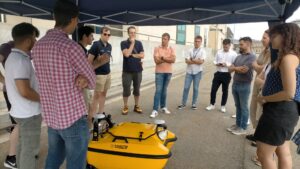ESA Phi-LabNET Spain’s Advisory Board holds its first meeting at the IEEC headquarters
On September 4th 2025, the ESA Phi-Lab Spain Advisory Board held its first meeting. The event, held at the Institute of Space Studies of Catalonia (IEEC), in Castelldefels (Barcelona), gathered key representatives from European and national space and climate change institutions, research centres, industry, and public administrations to discuss the progress of Phi-Lab Spain and its future directions.
The meeting was chaired by Josep Colomé, Director of the Area for the Promotion of the Space Sector of Catalonia (APEC) at the IEEC and the session was facilitated by Pepa Sedó (Head of Development and Innovation Office of the same centre) and Estel Blay (Programme Manager, also from the IEEC).
Phi-Lab Spain is part of the ESA’s ScaleUp Programme and is coordinated by the Institut d’Estudis Espacials de Catalunya (IEEC), as leader of a consortium formed by the i2CAT Foundation, the Cartographic and Geological Institute of Catalonia (ICGC), the Fundación General CSIC, the KIMbcn Foundation, Arribes Enlightenment, the University of Valencia (UVEG), the Polytechnic University of Catalonia (UPC), the Barcelona Supercomputing Center (BSC-CNS), the Ricardo Valle Institute of Innovation Foundation (INNOVA IRV), the ESA MELiSSA Pilot Plant of the Universitat Autònoma de Barcelona (UAB), and the Institute of Photonic Sciences (ICFO).
Agenda for the day
The programme of the meeting began with welcome and opening remarks by Josep Colomé, who acknowledged the participation of the Advisory Board, highlighting “the importance of institutional collaboration to maximise impact and foster synergies. Initiatives like Phi-Lab open up new opportunities to drive innovation and to strengthen the role of space technologies in addressing today’s challenges.”
This was followed by the introduction of Advisory Board members, during which each participant presented their institution and shared a short reflection on space innovation and climate resilience. Afterwards, Pepa Sedó and Estel Blay provided an overview of ESA Phi-Lab Spain and a review of the first year achievements, highlighting the launch of the first open call, the selection and start of the four first four projects, key milestones, participation in events, and plans for the next period.
The meeting concluded with a strategic discussion on lessons learned and the way forward, an interactive exchange where members reflected on challenges, ecosystem engagement, emerging trends, opportunities for partnerships, and provided recommendations to strengthen the impact of Phi-Lab Spain.
The participants were Roberto Cossu, Acting Head of ESA Innovation Services Section, ESA; Michele Iapaolo, ESA Phi-Lab Net coordinator, ESA Innovation Services ; Jose María Pérez, Head of National Programmes and Industry Department, Spanish Space Agency (AEE); Maria Galindo, Director General of Digital Policies, Government of Catalonia; Giuseppe Borghi, Head of Φ-lab Division, ESA (European Space Agency); Carlo Buontempo, Director of the Copernicus Climate Change Service, ECMWF (European Centre for Medium-Range Weather Forecasts); Leonardo Bejarano , Head of the Catalan Office for Climate Change, Generalitat de Catalunya; Emmanuel Pajot, Secretary General, EARSC (European Association of Remote Sensing Companies) and Sérgio Henrique Faria, Ikerbasque Research Professor at BC3 (Basque Centre for Climate Change) and Director of IzotzaLab.
This meeting marked an important milestone in the consolidation of Phi-Lab Spain as part of the ESA Phi-Lab Network, reinforcing its mission of promoting space-driven innovation for climate resilience. The insights and recommendations of the Advisory Board will play a crucial role in shaping the next steps of the initiative.


